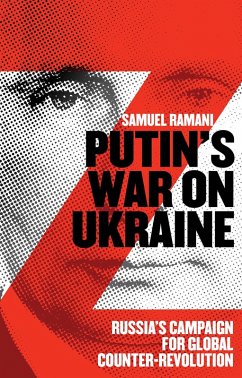Eight years after annexing Crimea, Russia embarked on a full-scale invasion of Ukraine in February 2022. Vladimir Putin viewed this attack on a neighbour as a legacy-defining mission, which sought to restore a central element of Russia's sphere of influence and undo Ukraine's surprisingly resilient democratic experiment. These aspirations were swiftly eviscerated, as the conflict degenerated into a bloody war of attrition and the Russian economy crumbled under the weight of sanctions.
This book argues that Putin's desire to unite Russians around a common set of principles and consolidate his personal brand of authoritarianism prompted him to pursue a policy of global counter-revolution; it was this which inspired Russia's military interventions in Crimea, Donbas and Syria, later steering Putin to war against Kyiv.
Samuel Ramani explores why Putin opted for all-out regime change in Ukraine, rather than a smaller-scale intervention in Donbas, and considers the impact on his own regime's legitimacy. This focus on the domestic drivers of invasion contrasts with alternative theories that highlight systemic factors, such as preventing NATO expansion. Ramani concludes by assessing the invasion's implications for Russia's long-term political and foreign policy trajectory, and how the international response to the conflict will reshape the global order.
This book argues that Putin's desire to unite Russians around a common set of principles and consolidate his personal brand of authoritarianism prompted him to pursue a policy of global counter-revolution; it was this which inspired Russia's military interventions in Crimea, Donbas and Syria, later steering Putin to war against Kyiv.
Samuel Ramani explores why Putin opted for all-out regime change in Ukraine, rather than a smaller-scale intervention in Donbas, and considers the impact on his own regime's legitimacy. This focus on the domestic drivers of invasion contrasts with alternative theories that highlight systemic factors, such as preventing NATO expansion. Ramani concludes by assessing the invasion's implications for Russia's long-term political and foreign policy trajectory, and how the international response to the conflict will reshape the global order.
Dieser Download kann aus rechtlichen Gründen nur mit Rechnungsadresse in A, D ausgeliefert werden.









